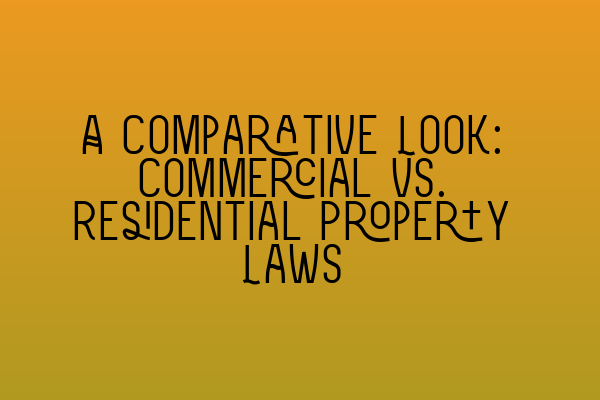Commercial and residential properties are two distinct sectors of the real estate industry that come with their own set of laws and regulations. As a solicitor specializing in property law at SQE Property Law & Land Law, I often work with clients who have questions about the differences between commercial and residential property laws. In this blog post, we will explore a comparative look at these two areas, highlighting the key aspects that differentiate them from one another.
Before we delve deeper into the comparison, it’s crucial to understand the fundamental difference between commercial and residential properties. Commercial properties are specifically designed for business purposes, such as office buildings, retail stores, industrial warehouses, and restaurants. On the other hand, residential properties are intended for individuals and families as their primary place of residence, including houses, apartments, condos, and townhouses.
One of the significant distinctions between commercial and residential property laws lies in the rights and responsibilities of tenants and landlords. Commercial lease agreements are typically more complex, often involving longer lease terms and negotiations on rental rates, maintenance responsibilities, and improvements to the property. In contrast, residential leases tend to be relatively simpler, typically involving standard rental agreements and focusing on tenant rights, rent payment, and property maintenance.
When it comes to property maintenance, commercial properties have more stringent regulations compared to residential properties. Commercial tenants are often responsible for the upkeep of the premises, including regular maintenance, repairs, and compliance with health and safety regulations. In contrast, residential landlords are typically responsible for ensuring that the property is habitable and meets certain health and safety standards, with tenants responsible for more minor maintenance tasks.
Disputes and eviction processes also differ between commercial and residential properties. For commercial properties, disputes often involve breach of contract or non-payment of rent, and evictions can be more straightforward with predetermined remedies and court processes in place. On the other hand, residential property disputes often revolve around issues such as lease violations, property damage, or non-payment of rent. The eviction process for residential properties typically requires court proceedings and adherence to strict legal procedures to protect tenant rights.
Another critical aspect to consider is taxation. Commercial properties are subject to commercial rates and taxes based on their assessed value, rental income, and business use. Residential properties, on the other hand, are subject to council tax, which is based on the property’s valuation and the number of occupants. Understanding these tax obligations is crucial for both property owners and tenants.
From a legal perspective, commercial property transactions require more extensive due diligence, often involving searches for planning permissions, zoning restrictions, environmental assessments, and other factors that may impact the property’s use or value. Residential transactions, while still requiring due diligence, generally involve fewer complexities, focusing primarily on ownership verification, title searches, and mortgage arrangements.
Now that we have explored the key aspects that differentiate commercial and residential property laws, it’s important to understand that these comparisons are just scratching the surface. The intricacies and nuances within each area of property law are vast, requiring expert legal advice from specialists like myself at SQE Property Law & Land Law.
Whether you are a property investor, tenant, or buyer, understanding the applicable laws and regulations is crucial for making informed decisions in the real estate market. Seeking guidance from experienced solicitors like us can help you navigate the complexities of property law and ensure that your rights and interests are protected.
If you found this article helpful, I encourage you to explore our related articles on topics such as SQE 1 and SQE 2 exam preparation, including mock exams and practice quizzes. Planning to pursue a career in property law? Our SQE 1 and SQE 2 preparation courses can equip you with the knowledge and skills necessary for success. Stay up to date with the latest SRA SQE exam dates to ensure timely and efficient exam registration.
At SQE Property Law & Land Law, we pride ourselves on providing expert legal advice and services to our clients in the real estate industry. Contact us today to discuss your property law needs and let our team of professionals guide you through the intricacies of commercial and residential property laws.
